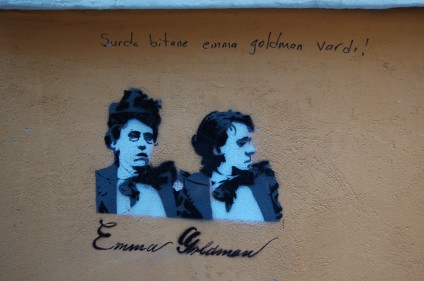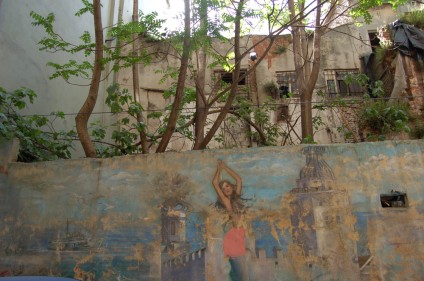
Zwei sehr unterschiedliche Motive hab ich für den Auftakt meiner Bildreihen aus Istanbul ausgewählt. Die Gemeinsamkeiten beschränken sich auf die Frauenmotive… Hier ist es eine dreifarbige Schablone der Anarchistin Emma Goldman zu sehen. Von ihr stammt der bekannte Satz: „If I can’t dance, I don’t want to be part of your revolution.“ Wie ich heute erst entdeckte, war sie ja eine sehr spannende und vordenkende Persönlichkeit! Wenn ich mich recht erinnere steht dadrüber mit dem Marker etwas, wie „Emma Goldman an der Mauer in der Stadt!„ [„Surda bitane emma goldman vardi„] “Hier (an dieser Stelle) gab es mal eine Emma Goldman” [Danke, Alican!]

Und hier eine leichtbekleidete Dame – ein antikes Wandbild?! – vor schöner Bruchbude, ebenfalls im Stadtteil Beyoglu auf europäischer Seite der Stadt.
Beide Bilder sind gleichzeitig eine persönliche special Dedication zu zwei verschiedenen netten Menschen in Istanbul… Ihr wisst schon, dass Ihr gemeint seid, wa?! DANKE für die schöne Zeit zusammen!





„If I can’t dance, I don’t want to be part of your revolution.“ — stammt so nicht von Emma Goldman. Es handelt sich nicht um ein Zitat. Die Grundlage dafür ist folgende Passage aus Living My Life (1931):
„At the dances I was one of the most untiring and gayest. One evening a cousin of Sasha, a young boy, took me aside. With a grave face, as if he were about to announce the death of a dear comrade, he whispered to me that it did not behoove an agitator to dance. Certainly not with such reckless abandon, anyway. It was undignified for one who was on the way to become a force in the anarchist movement. My frivolity would only hurt the Cause.
I grew furious at the impudent interference of the boy. I told him to mind his own business. I was tired of having the Cause constantly thrown into my face. I did not believe that a Cause which stood for a beautiful ideal, for anarchism, for release and freedom from convention and prejudice, should demand the denial of life and joy. I insisted that our Cause could not expect me to become a nun and that the movement would not be turned into a cloister. If it meant that, I did not want it. „I want freedom, the right to self-expression, everybody’s right to beautiful, radiant things.“ Anarchism meant that to me, and I would live it in spite of the whole world — prisons, persecution, everything. Yes, even in spite of the condemnation of my own closest comrades I would live my beautiful ideal.“